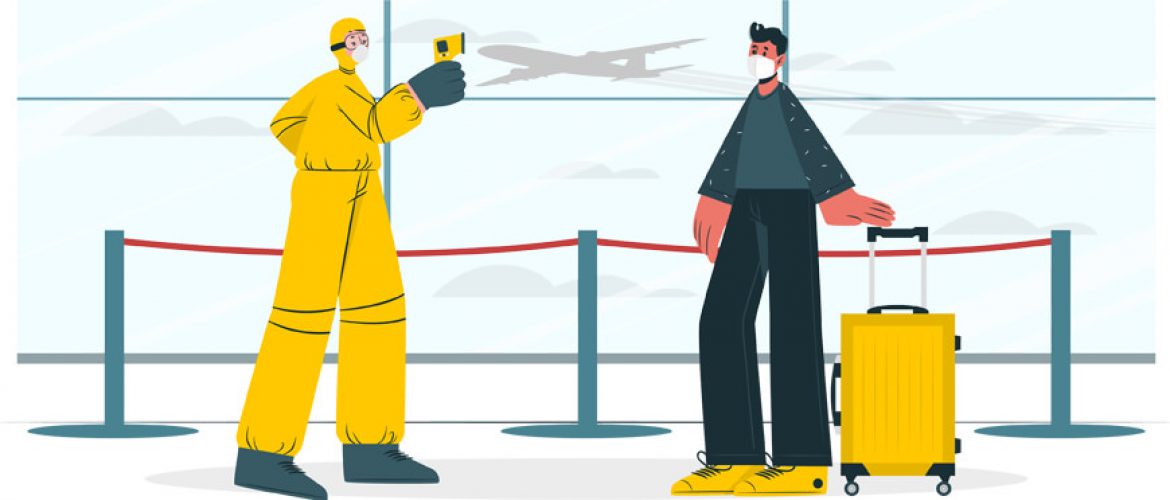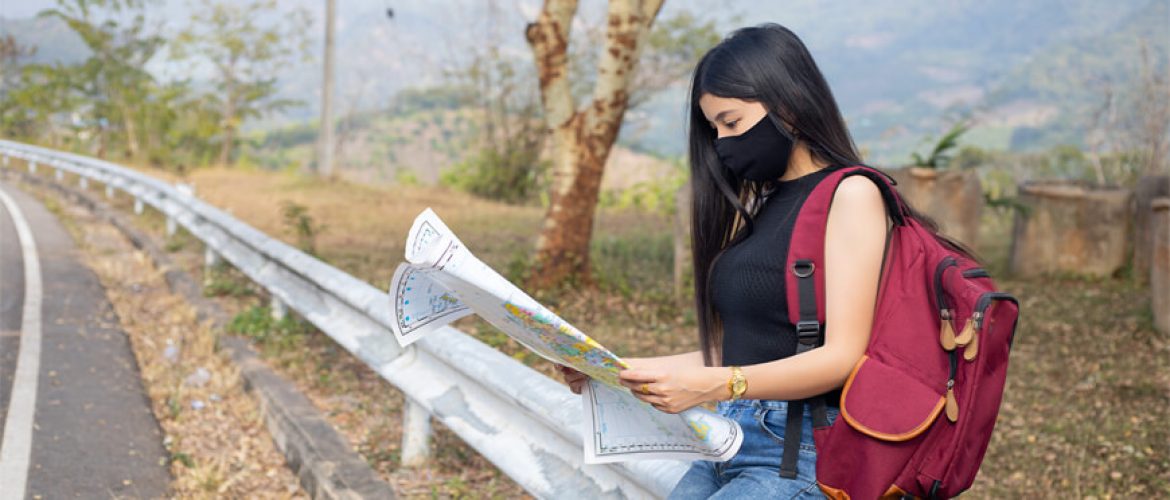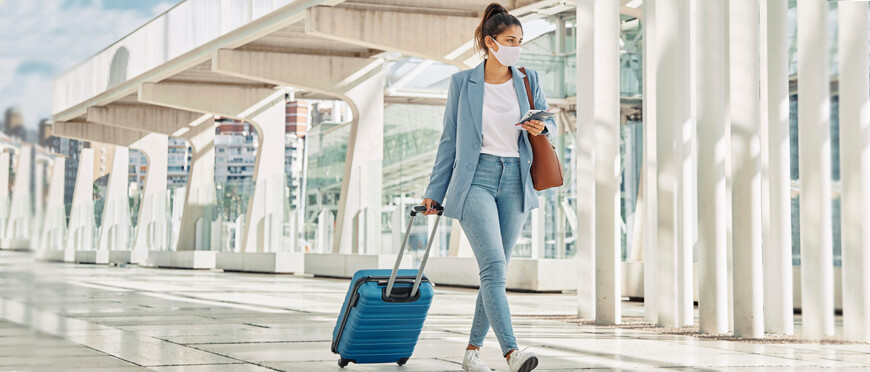Viruses have become a part of our lives today and are with us everywhere. A new virus called corona has become a global epidemic and has even disrupted travel worldwide for some time now.
The coronavirus epidemic has changed the way we all travel. If in the past, before traveling, we found information about attractions and the transportation system and other tourist services, today we have to research the coronavirus restrictions, as well.
covid-19 Travel Guide
Table of Contents
Predictably, we will be worried about traveling during the Covid-19 pandemic, but there is no need to worry if we travel with full knowledge and information about covid-19 travel guide.
Countries have had different experiences with the Coronavirus. Some have been able to control the virus to some extent, and some have not. Depending on this experience, countries’ laws on opening their borders are different. Fortunately, with the start of vaccination in the world, the severity of the disease is reduced, and many countries intend to reduce the restrictions.
Currently, widespread vaccination promises to end the Coronavirus (COVID-19) pandemic, but it will not happen overnight.

Risk of Health and covid-19 Travel Guide
Traveling exposes us to more viruses, so it is essential to know what to look for when we travel during this pandemic to avoid getting the Coronavirus. And what the Covid-19 Travel Guide includes. Travel is an important part of our lives, and its importance is not hidden from anyone.
Various studies have been conducted on the importance of travel on health, showing that travel is very effective for mental health. Those who travel not only gain new experiences but also subconsciously improve their health.
Due to the outbreak of the Coronavirus, travel to different parts of the world has been disrupted in the last two years, and people have been forced to stay at home. Perhaps the longest distance most of them have traveled during the epidemic has been from home to the supermarket or from work to home.
The psychological effects of this cannot be ignored, and even some psychologists believe that after the coronavirus epidemic, humans need extensive psychotherapy.
Nevertheless, since travel cannot be removed from the human life cycle, we must learn how to travel with the least risk of getting the Coronavirus.
General Tips on covid-19 Travel guide
If you plan to travel, follow the guide below to reduce your risk of getting the Coronavirus:
covid-19 Travel guide; before the trip
- Keep up to date with the latest official advice offered by the country you are departing from and traveling to. All countries may impose travel restrictions without notice.
- When choosing a travel destination, you may want to pay more attention to your domestic destinations.
- Check entry restrictions, screening, and quarantine requirements on arrival.
- Borders may be closed, or you may be required to quarantine indefinitely upon arrival.Plan for any possible delays in returning home and financial consequences or practical action that may be required.
- Try to avoid travel where physical distancing may be difficult for prolonged periods.
- Plan to avoid traveling at peak times and take less congested routes wherever possible.
- Before you travel, be sure to get a coronavirus test and ensure you are not sick or a carrier.
- Before traveling, be sure to check the following to choose your accommodation:
- Enhanced cleaning procedures
- Social distancing measures
- Masking of staff and guests
- Contactless payment
- When packing for the trip, get all the necessary medicines or essential travel hygiene items (masks, disinfectants, etc.)
Covid-19 Travel Guide; during the trip
- During your trip, avoid visiting crowded spaces, poorly ventilated enclosed spaces, as well as any social or mass gatherings such as concerts, events, and parties.
- Wearing a mask over your nose and mouth is required on airplanes, buses, trains, and other forms of public transportation.
- Wash your hands often or use hand sanitizer.
- Avoid crowds and stay at least 2 meters from anyone who is not traveling with you.
- Avoid eating and drinking on public transport because you can keep your mask on at all times.
Covid-19 Travel Guide; after the trip
- Get tested after the trip, and even if the test is negative, quarantine yourself at home for seven days.

Covid-19 Travel Guide when Using Transportation During the pandemic
In all types of transportation (public or private), we must do several things to prevent being infected with the Covid-19:
Air Travel
The risk of contracting the virus in the aircraft compartment is low due to air conditioning. However, the crowded nature of some flights and the contact with large numbers of people on security lines and airport terminals make it difficult to maintain social distance.
- Instead of handing boarding passes to TSA officers, travelers should place passes (paper or electronic) directly on the scanner and then hold them up for inspection.
- Food items should be transported in a plastic bag and placed in a bin for screening. Separating food from carry-on bags lessens the likelihood that screeners will need to open bags for inspection.
- Personal items such as wallets, keys, and telephones should be placed in the wallet to reduce handling during screening.
- Passengers must wear a mask at all stages unless security officers want to remove it to verify identity.
Car Travel
One of the points of the Covid-19 travel guide is that you reduce the risk of infection because you have more control over the environment with car travel during the epidemic.
- Be sure to pack face masks, hand sanitizer, and disinfectant wipes in an easily accessible spot so that you can use them during the trip as necessary.
- Prepare food and water to take on the trip. Consider including nonperishable items to tide you over if access to restaurants and grocery stores is limited.
- Plan to make as few stops as possible, but stop driving if you become drowsy.
- If you choose to pick up a meal on the road, opt for restaurants that offer drive-thru or curbside service.
- Make sure your vehicle is safe before traveling. This avoids stopping in the middle of the road, reducing the use of off-road repair services and the possibility of interacting with high-risk people and getting the Coronavirus.
Other vehicles
If you travel by bus or train and are unvaccinated, be aware that sitting or standing within 6 feet (2 meters) of others for a prolonged period can put you at higher risk of getting or spreading COVID-19. One of the tips of the Covid-19 Travel Guide is that if you want to use public transportation, keep a social distance, wear a mask, and use a hand sanitizer or wash your hands when you reach your destination. If you plan to use a ride-hailing service, do not sit in the front seat near the driver.
Covid-19 Travel guide A Nutshell
After about two years, travel during the covid-19 pandemic sounds a bit difficult. However, if you desire to travel during this pandemic, then by following the covid-19 travel guide, you can reduce the risk of contracting this disease and travel safely.
Life is not inherently risk-free. The best and most memorable memories always happen in the riskiest situations.

Comment (0)